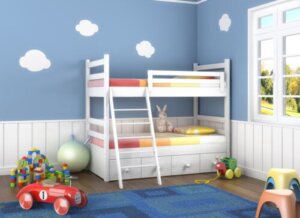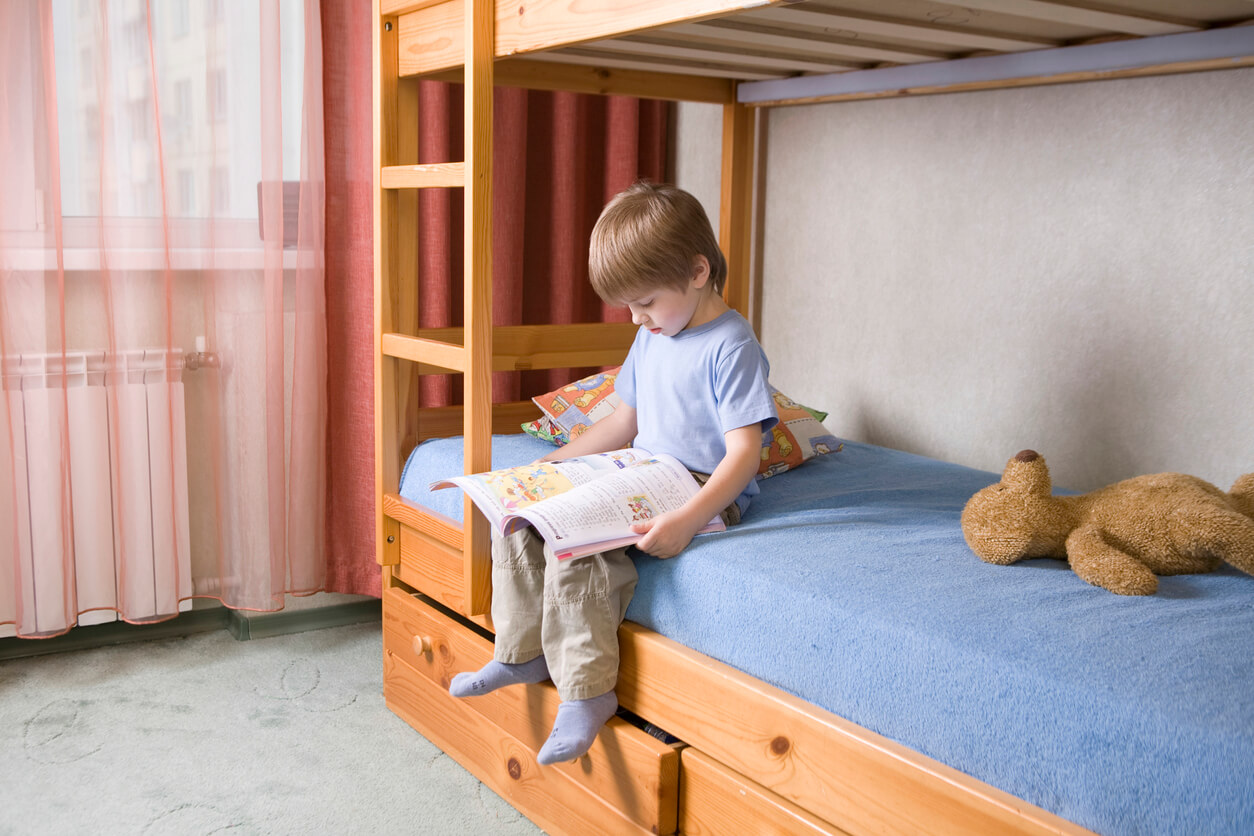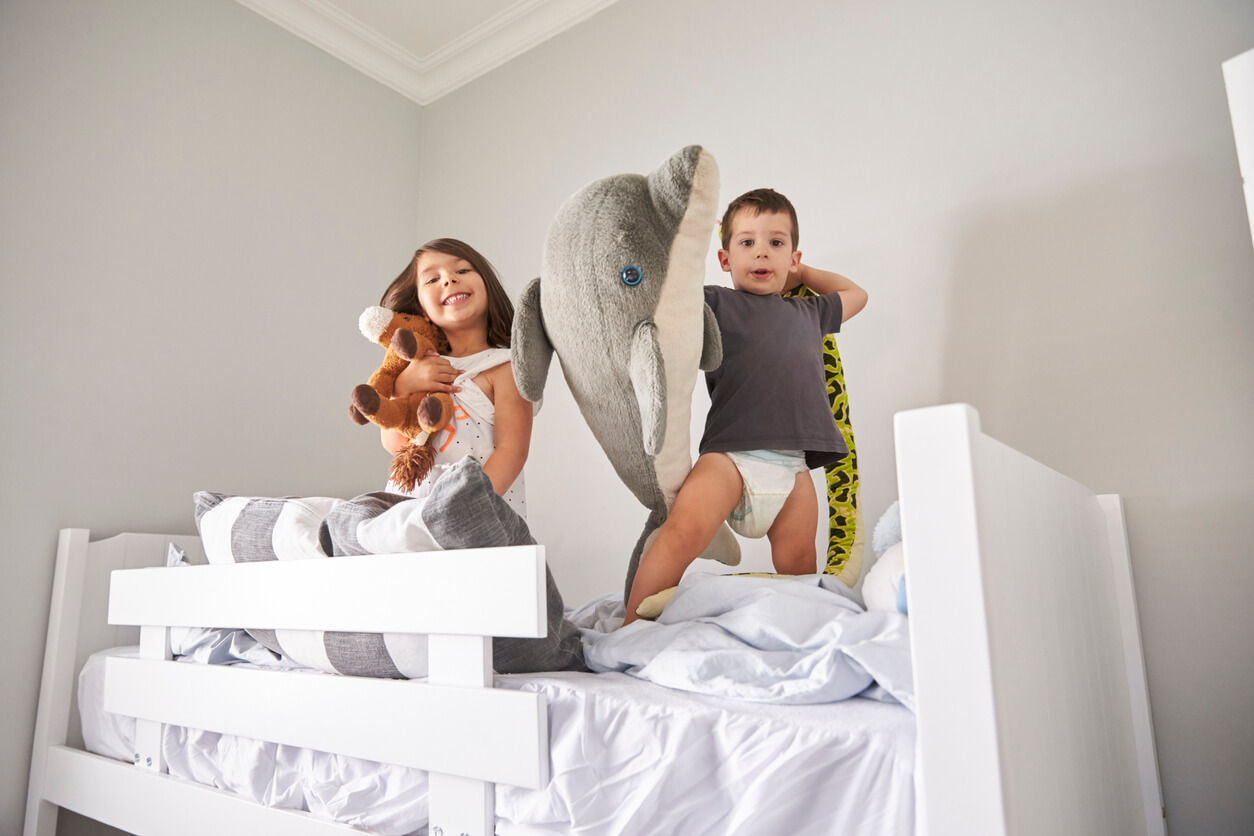20 Recommendations for Bunk Bed Safety

If you have several children and little space, you’ve probably opted for a bunk bed. However, you may be constantly worried when your children sleep there because of the stairs, the height, and so on. In short, because of all the risks involved in sleeping and playing on that structure. For this reason, we’ve put together the following list with the best recommendations for bunk bed safety to prevent accidents and enjoy a peaceful and safe rest. Keep reading!
Aspects to consider before purchasing a bunk bed
According to the parameters of the Guide for parents on the prevention of unintentional injuries in children, endorsed by the Spanish Association of Pediatrics (AEP), we offer the following recommendations before acquiring a bunk bed:
- Check that it complies with national requirements.
- Check that there are railings on all four sides that make up the piece, including the side that’s attached to the wall.
- Also, make sure that these rails are fastened, with no hooks to anchor them.
- The space between the bunk bed frame and the protective barrier must be less than 3 inches.
- The space between the railing bars must be less than 2 3/4 inches.
- The bed base should be fastened by straps or slats attached to the bunk bed itself. This way, the child won’t be able to fall out even if he kicks it several times.
- The mattress must be the correct size and mustn’t leave any space either at the headboard or at the foot of the bed.
- The ladder should be well attached and placed at the longest part of the bunk bed.

Recommendations for bunk bed safety
Many parents don’t take into account that children may be so sleepy when they wake up that they may not realize they’re at a certain height from the floor. For this reason, attention must be paid to certain aspects so that your little one gets used to sleeping in a bunk bed.
Some of these issues are the minimum recommended ages to be placed in the top bunk bed, the type of lighting in the room, and the personal characteristics of the children. In order to protect them from injury, keep the following tips in mind:
- Always keep safety gates in place (even if the child is getting older).
- Don’t allow children under the age of six to sleep in the top bunk.
- Avoid leaving children playing alone in a room with bunk beds.
- Teach children to go up and down the ladder so that they avoid using any other furniture for this purpose.
- Install nightlights so that children have enough visibility in case they need to get up.
- Make sure the lamps aren’t in direct contact with the bunk bed. The best option is to use LED bulbs, as they don’t heat up and illuminate very well.
- Also, don’t install clamp lamps or cord lamps near the bunk.
- Don’t let your kids jump on top of the bed.
- Incorporate a carpeted floor to avoid accidents.
- Whenever possible, avoid surrounding the bunk bed with other furniture or objects.
- Don’t place strings, cords, or decorative ribbons on the beds. Without a doubt, this can be quite dangerous for your little one.
- Always keep the bunk bed in perfect condition, especially the protective barriers, the ladder, and the slats of the bed base.

Do your children sleep in a bunk bed? Follow these recommendations for bunk bed safety and avoid accidents
There’s no doubt that there are many considerations to take into account when your child is going to sleep in a bunk bed. However, the truth is that information is power. Therefore, we hope that these recommendations have helped you to be clear on the main points to consider to prevent any type of accident related to the use of this piece.
Of course, if a blow or any type of accident occurs, don’t hesitate to go to the doctor as soon as possible. They’ll be the one who’ll be able to give you the best possible advice once they’ve seen your child.
If you have several children and little space, you’ve probably opted for a bunk bed. However, you may be constantly worried when your children sleep there because of the stairs, the height, and so on. In short, because of all the risks involved in sleeping and playing on that structure. For this reason, we’ve put together the following list with the best recommendations for bunk bed safety to prevent accidents and enjoy a peaceful and safe rest. Keep reading!
Aspects to consider before purchasing a bunk bed
According to the parameters of the Guide for parents on the prevention of unintentional injuries in children, endorsed by the Spanish Association of Pediatrics (AEP), we offer the following recommendations before acquiring a bunk bed:
- Check that it complies with national requirements.
- Check that there are railings on all four sides that make up the piece, including the side that’s attached to the wall.
- Also, make sure that these rails are fastened, with no hooks to anchor them.
- The space between the bunk bed frame and the protective barrier must be less than 3 inches.
- The space between the railing bars must be less than 2 3/4 inches.
- The bed base should be fastened by straps or slats attached to the bunk bed itself. This way, the child won’t be able to fall out even if he kicks it several times.
- The mattress must be the correct size and mustn’t leave any space either at the headboard or at the foot of the bed.
- The ladder should be well attached and placed at the longest part of the bunk bed.

Recommendations for bunk bed safety
Many parents don’t take into account that children may be so sleepy when they wake up that they may not realize they’re at a certain height from the floor. For this reason, attention must be paid to certain aspects so that your little one gets used to sleeping in a bunk bed.
Some of these issues are the minimum recommended ages to be placed in the top bunk bed, the type of lighting in the room, and the personal characteristics of the children. In order to protect them from injury, keep the following tips in mind:
- Always keep safety gates in place (even if the child is getting older).
- Don’t allow children under the age of six to sleep in the top bunk.
- Avoid leaving children playing alone in a room with bunk beds.
- Teach children to go up and down the ladder so that they avoid using any other furniture for this purpose.
- Install nightlights so that children have enough visibility in case they need to get up.
- Make sure the lamps aren’t in direct contact with the bunk bed. The best option is to use LED bulbs, as they don’t heat up and illuminate very well.
- Also, don’t install clamp lamps or cord lamps near the bunk.
- Don’t let your kids jump on top of the bed.
- Incorporate a carpeted floor to avoid accidents.
- Whenever possible, avoid surrounding the bunk bed with other furniture or objects.
- Don’t place strings, cords, or decorative ribbons on the beds. Without a doubt, this can be quite dangerous for your little one.
- Always keep the bunk bed in perfect condition, especially the protective barriers, the ladder, and the slats of the bed base.

Do your children sleep in a bunk bed? Follow these recommendations for bunk bed safety and avoid accidents
There’s no doubt that there are many considerations to take into account when your child is going to sleep in a bunk bed. However, the truth is that information is power. Therefore, we hope that these recommendations have helped you to be clear on the main points to consider to prevent any type of accident related to the use of this piece.
Of course, if a blow or any type of accident occurs, don’t hesitate to go to the doctor as soon as possible. They’ll be the one who’ll be able to give you the best possible advice once they’ve seen your child.
All cited sources were thoroughly reviewed by our team to ensure their quality, reliability, currency, and validity. The bibliography of this article was considered reliable and of academic or scientific accuracy.
- Ma, J., Mintegi, S., De, ©., Asociación, ©., De, E., Aguirre, P., Madrid, 28009, & Fundación, ©. (n.d.). guía para padres. Aeped.Es. Retrieved May 2, 2022, from http://www.aeped.es/sites/default/files/documentos/guia-padres-prevencion-lesiones-no-intencionadas.pdf
- (N.d.). UNE-EN 747-1:2012+A1:2015. Une.Org. Retrieved May 2, 2022, from https://www.une.org/encuentra-tu-norma/busca-tu-norma/norma/?c=N0055563.
This text is provided for informational purposes only and does not replace consultation with a professional. If in doubt, consult your specialist.








